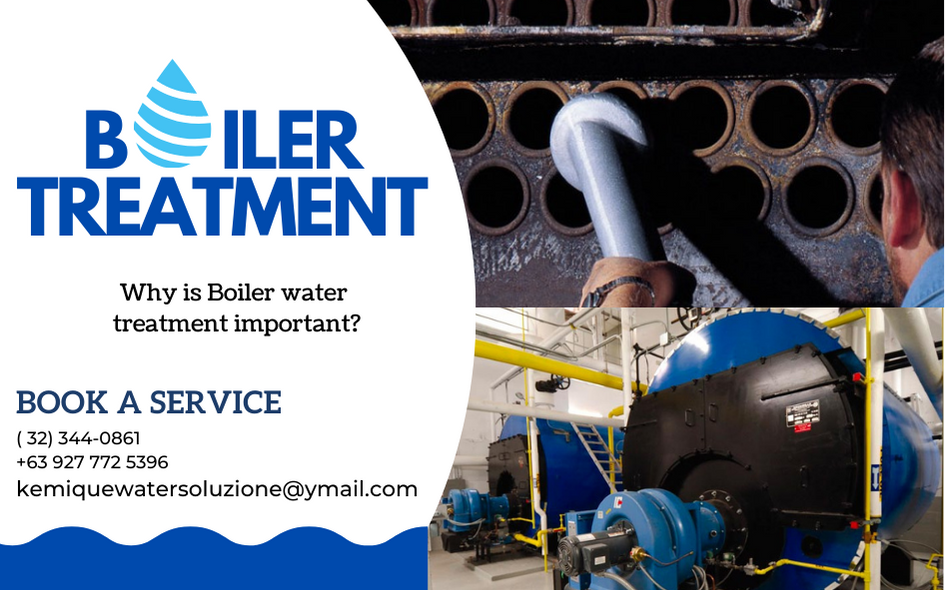What Is Boiler Water Treatment?
Boiler water treatment is a process of purifying and improving the quality of the water that is used by a boiler system. The combustion process within a boiler relies heavily on the clarity and quality of the water so that it can perform the tasks that it was created for: producing high-quality steam, protecting against corrosion and performing continuous heat exchange. When the water that a boiler uses is not treated, the entire system can suffer from poor efficiency and permanent damage to equipment that shortens the boiler’s life and may also create a dangerous situation where they could explode due to superheating
Why is Boiler treatment required?
There are many common issues which can occur if you do not treat the water in your boiler system correctly. Letting these issues build up will inevitably lead to a breakdown
- Boiler corrosion: water contains oxygen which will eventually lead to the thinning and pitting of the metal pipes. This can interfere with the heat transfer abilities of the boiler and contamination of the water itself. Suitable boiler water treatments will eliminate oxygen from the water and help prevent corrosion.
- Impurities: water quality is a vital aspect of proper boiler functionality. A boiler with excessive impurities in the water will eventually break down as it can no longer function fully. Proper treatment will break down impurities and restore full function.
- Foaming (carry-over):a high concentration of solids in the water will lead to frothing or foaming on the surface of the water. When this water evaporates as steam it can cause deposits in valves, heat exchangers, turbines, and super heaters, and strip away the magnetic layer in steam lines. This can result in the general corrosion and reduced function of your system. Treatment can reduce the visibility of foaming and prevent these issues.
- Reduce suspended solids: corrosion, scaling and impurities in the water cause an accumulation of solids which can pose a number of problems within the boiler. Hard water: hard water can develop inside the boiler and eventually cause a build up of scale deposits, leading to impurities in the water. Water softening treatment is one of the most common and vital parts of boiler treatment.
All of these issues, if not properly prevented or left untreated, can leave you with thousands of dollars in repair costs, as well as stranding your facility without hot water. A nuisance if it is a domestic or office property, and a nightmare for hotels or hospitals, for example.
How Do You Maintain A Boiler System?
Even the most aggressive forms of prevention can’t stop minor corrosion from eventually happening. But, with the right approach, the effects of corrosion can be minimized and extend the life of your boiler. While Kemique Water Soluzione cannot reverse time and corrosion – we can certainly stop corrosion in its tracks
Here’s what to do to minimize the effect of corrosion before it happens:
-Use a boiler logbook. Regularly tracking the normal operation of your boiler room equipment makes it easy to spot when something critical changes.
-Deaerator pressure or feed-tank temperature changes will give advance warning of a more expensive corrosion problem. pH changes could indicate problems with water treatment or process contamination.
-Treat Feedwater. Additives can ensure that any oxygen that makes its way to the boiler in the feedwater is rapidly absorbed before it has the opportunity to form corrosive cells and blisters.
-Work with a good water chemistry company (like Kemique Water Soluzione) to stay on top of your boiler water.
-Implement a strict, regular service program to ensure the boiler stays clean and free of scale and corrosion problems. Train employees to ensure a complete understanding of the boiler system, how it operates and its importance
If the boiler is being inspected, the root cause can be addressed early, avoiding more costly repairs.
For hydronic systems, check for leaks and monitor the quantity of make-up water. Hot water heating systems shouldn’t need make-up water unless something is wrong. Call your service provider to fix the leak right away, or you may be replacing the boiler next year.
Automate boiler chemical feed and surface blowdown to maintain uniform chemical residuals and conductivity levels.
Needs Attention Externally And Internally
Whether a boiler needs both external and internal attention depends upon the size and purpose that the boiler serves. If a boiler must handle a greater volume of water than it can hold, external water treatment is necessary to ensure that water is purified on its way to the boiler instead of only when it is inside. Smaller boilers with only moderate water pressure may be able to successfully treat only water within the boiler. To determine which type of treatment your boiler system will need, speak to a professional water treatment expert.
How Much Does it Cost to Maintain a Boiler System
Because of a boiler’s vital function for any facility, their breakdown can result in safety concerns, not to mention a huge cost in order to replace or repair the system. Repair costs to boilers can be steep and can range anywhere from a few thousand dollars to over $1 million depending on size, function and accessibility. But it doesn’t stop there. This price is in addition to the expense of operational down times to get the boilers repaired or replaced and up and running properly.
Talk To The Boiler Water Treatment Pros
Whether you have just installed a new boiler and want to begin proper maintenance right away or you believe that your boiler is suffering from untreated water, be sure to reach out to experts who can offer personalized guidance on your boiler system. The skilled professionals at Tower Water set the standard in water treatment and would be happy to meet with you to discuss the details of your individual system. Reach out to schedule an appointment so that you can keep your boiler functioning for years to come.


0 Comments